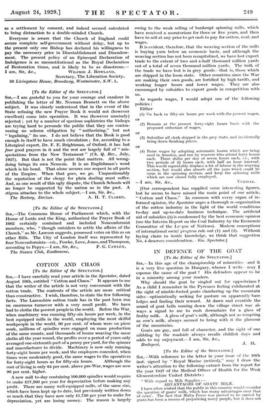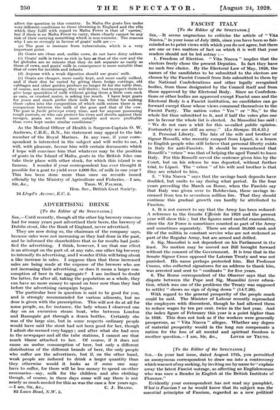[To the Editor of the SPECTATOR.] Sin,—With reference to the
letter in your issue of the 10th inst. signed by "Royal Marine (retired)," may I draw the writer's attention to the following extract from the report for the year 1927 of the Medical Officer of Health for the West Gloucestershire United Districts :
"With regard to Milk Supplies :— ADVANTAGES OF GOATS' MILK.
I have often wished that the public in this country would consider the question of goats' milk, which has many advantages over that of cows'. The fact that Malta Fever was proved to be carried by goats has been a means of prejudicing many people, but it does nob affect the question in this country. In Malta the goats live under very different conditions to those obtaining in England and the role which they fulfil with regard to Malta Fever is that of 'carrier,' but if there is no Malta Fever to carry, there clearly cannot be any risk of their carrying something which is non-existent. The reasons why I am so strongly in favour of goats' milk are :— (a) The goat is immune from tuberculosis, which is a very important point.
(b) Goats are clean and, unlike cows, do not have dirty udders.
(c) Goats' milk is twice as rich 'infats as that of the cow and the fat globules are so minute that they do not separate as easily as those of cows, and goats' milk in consequence is more suitable than that of cows for invalids and infants.
• (d) Anyone with a weak digestion should use goats' milk.
(e) Goats are cheaper, more easily kept, and more easily milked, and if their diet be varied by giving them hedge cuttings, old cabbages and other garden produce no longer fit for the table (but, of course, not decomposing), they will thrive ; but to expect them to give large quantities of milk without giving them a little corn such as oats, or crushed maize, is asking too much. I have kept goats for years and much prefer their milk for tea, whilst for making those cakes into the composition of which milk enters there is no comparison between the milk of the goat and that of the cow. The goat is facile princepe every time, and for anyone possessing rough pasture, or who can protect his trees and shrubs against their ravages, goats are much more suitable and more profitable than cows kept under similar conditions."
As the Medical Officer of Health is Surgeon-Captain 0. W.
Andrews, C.B.E., R.N., his statement may appeal to the late member of the Royal Marines. In any -case, if your corre- spondent is interested in the subject and will write to me, I will, with pleasure, favour him with certain documents which
I hope will convince him that whatever may be the position of goats in the Island of Malta, goats in the British Isles can take their place with other stock, for which this island is so famous. I wonder if your correspondent has ever thought it possible for a goat to yield over 4,000 lbs. of milk in one year ? This has been done more than once on records issued officially by the Ministry of Agriculture and Fisheries.—I am,
Hon. Sec., British Goat Society. 10 Lloyd's Avenue, E.C. 3.































 Previous page
Previous page